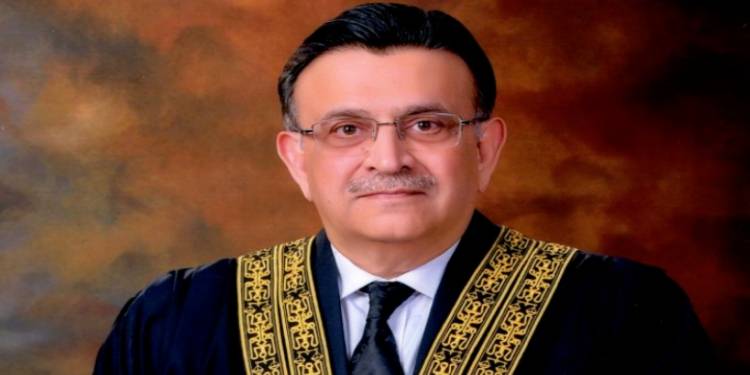
Chief Justice of Pakistan (CJP) Umar Ata Bandial on Thursday urged the ruling alliance and the opposition to hold joint talks on elections for the sake of the Constitution.
During the hearing of the election delay case, CJP Bandial urged everyone to sit together for the sake of the Constitution.
The hearing was held by the Supreme Court while negotiations on elections between the government and the Pakistan Tehreek-e-Insaf (PTI) were at a standstill.
Attorney General of Pakistan (AGP) Mansoor Usman Awan opened the session by informing the court that the opposition and the government had had their first contact on April 19 and had made plans to meet on April 26.
The AGP claimed that PTI leader Asad Qaiser told the federal ministers Ayaz Sadiq and Saad Rafique that he lacked the power to hold negotiations.
He informed the court that the members of the ruling coalition met on Wednesday. Although two of the coalition's members had reservations about the talks, they managed to come to an agreement, he added.
Awan informed the court that Senate Chairman Sadiq Sanjrani had requested four names from the Treasury and Opposition benches in Parliament in a letter to the two parties.
CJP Bandial asked what the government did at this point after Qaiser notified them that he was unable to hold negotiations.
The AGP responded by saying that they learned on Tuesday through the media that PTI Vice Chairman Shah Mahmood Qureshi has the right to hold negotiations.
The CJP then inquired as to what authority the Senate chairman had been approached with. AGP Awan replied that the senate chairman was asked to intercede since his position served as a "symbol of the federation."
Farooq H. Naek had stated during a prior hearing that the Senate chairman would help the talks, CJP Bandial remarked.
"It is a political issue, so political leaders should be allowed to solve the problem. Let politicians decide the future of politics," said Naik.
During the hearing of the election delay case, CJP Bandial urged everyone to sit together for the sake of the Constitution.
The hearing was held by the Supreme Court while negotiations on elections between the government and the Pakistan Tehreek-e-Insaf (PTI) were at a standstill.
Attorney General of Pakistan (AGP) Mansoor Usman Awan opened the session by informing the court that the opposition and the government had had their first contact on April 19 and had made plans to meet on April 26.
The AGP claimed that PTI leader Asad Qaiser told the federal ministers Ayaz Sadiq and Saad Rafique that he lacked the power to hold negotiations.
He informed the court that the members of the ruling coalition met on Wednesday. Although two of the coalition's members had reservations about the talks, they managed to come to an agreement, he added.
Awan informed the court that Senate Chairman Sadiq Sanjrani had requested four names from the Treasury and Opposition benches in Parliament in a letter to the two parties.
CJP Bandial asked what the government did at this point after Qaiser notified them that he was unable to hold negotiations.
The AGP responded by saying that they learned on Tuesday through the media that PTI Vice Chairman Shah Mahmood Qureshi has the right to hold negotiations.
The CJP then inquired as to what authority the Senate chairman had been approached with. AGP Awan replied that the senate chairman was asked to intercede since his position served as a "symbol of the federation."
Farooq H. Naek had stated during a prior hearing that the Senate chairman would help the talks, CJP Bandial remarked.
"It is a political issue, so political leaders should be allowed to solve the problem. Let politicians decide the future of politics," said Naik.

